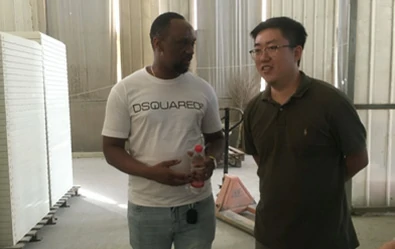loading...
- No. 9, Xingyuan South Street, Dongwaihuan Road, Zaoqiang County, Hengshui, Hebei, China
- admin@zjcomposites.com
- +86 15097380338
- Welcome to visit our website!
frp pressure vessel manufacturers
Understanding FRP Pressure Vessels and Their Manufacturers
FRP (Fiber Reinforced Plastic) pressure vessels have gained widespread acceptance in various industries due to their unique properties and advantages over traditional materials like metal. These vessels, crafted from composite materials, are primarily used to store or transport gases and liquids under pressure. Their lightweight, high strength, and corrosion resistance make them an ideal choice for applications across diverse sectors, including chemical processing, water treatment, and oil and gas.
What are FRP Pressure Vessels?
FRP pressure vessels are made from a combination of reinforced fibers (usually glass or carbon) and a polymer resin. The fibers provide the structural strength, while the resin offers chemical resistance and environmental durability. This composition results in vessels that are not only lighter than their steel or concrete counterparts but also resistant to corrosion, which is particularly advantageous in harsh environments.
The manufacturing process of FRP pressure vessels involves several steps, including the layup of resin and fibers, curing, and testing to ensure that they meet safety standards. Advanced techniques like filament winding and resin transfer molding are often employed to enhance the structural integrity and performance of these vessels.
Advantages of FRP Pressure Vessels
The benefits of using FRP pressure vessels are numerous
1. Corrosion Resistance One of the primary advantages of FRP vessels is their resistance to corrosion. Unlike metal vessels that can succumb to rust and chemical degradation, FRP vessels can withstand aggressive chemicals and harsh environmental conditions.
2. Lightweight FRP vessels are significantly lighter than their metal counterparts, making them easier to transport and install. This feature translates to lower transportation costs and simpler installation procedures.
3. High Strength-to-Weight Ratio The composite materials used in FRP construction provide a high strength-to-weight ratio, ensuring that these vessels can withstand high pressures without the added weight.
4. Thermal Insulation FRP vessels can also offer better thermal insulation properties compared to metal vessels, which can be beneficial in applications where temperature control is crucial.
frp pressure vessel manufacturers

5. Cost-Effectiveness Although the initial investment for FRP vessels can be higher than for conventional materials, their longevity and reduced maintenance costs result in lower overall lifecycle costs.
Choosing the Right Manufacturer
Selecting a reliable manufacturer for FRP pressure vessels is crucial to ensure quality and compliance with health and safety standards. Here are several factors to consider when choosing an FRP pressure vessel manufacturer
1. Experience and Expertise Opt for manufacturers with extensive experience in producing FRP pressure vessels. They should have a proven track record of successful projects in relevant industries.
2. Certifications and Compliance Ensure that the manufacturer adheres to industry standards and certifications, such as ASME (American Society of Mechanical Engineers) or ISO (International Organization for Standardization) certifications. Compliance with these standards is essential for safety and reliability.
3. Quality Control A reputable manufacturer should have a robust quality control process in place. This includes testing raw materials, in-process inspections, and final product evaluations to guarantee that the vessels meet the required specifications.
4. Customization Capabilities Depending on your application, you may need customized FRP pressure vessels. Look for manufacturers that can tailor their products to meet specific requirements, including size, shape, and chemical resistance.
5. After-Sales Support Post-manufacturing support is essential for maintenance and troubleshooting. Choose a manufacturer that provides comprehensive after-sales service to ensure the longevity and performance of the vessels.
Conclusion
In summary, FRP pressure vessels offer numerous advantages, making them a preferred choice in various industries. Their lightweight design, corrosion resistance, and cost-effectiveness position them as a suitable alternative to traditional materials. By carefully selecting a reputable manufacturer that meets industry standards and offers quality assurance, businesses can effectively harness the benefits of FRP pressure vessels. As industries continue to innovate and evolve, the demand for these advanced materials will likely grow, paving the way for greater efficiency and sustainability in operations.
-
The Rise of FRP Profiles: Strong, Lightweight, and Built to LastNewsJul.14,2025
-
SMC Panel Tanks: A Modern Water Storage Solution for All EnvironmentsNewsJul.14,2025
-
GRP Grating: A Modern Solution for Safe and Durable Access SystemsNewsJul.14,2025
-
Galvanized Steel Water Tanks: Durable, Reliable, and Ready for UseNewsJul.14,2025
-
FRP Mini Mesh Grating: The Safer, Smarter Flooring SolutionNewsJul.14,2025
-
Exploring FRP Vessels: Durable Solutions for Modern Fluid HandlingNewsJul.14,2025
-
GRP Structures: The Future of Lightweight, High-Performance EngineeringNewsJun.20,2025
